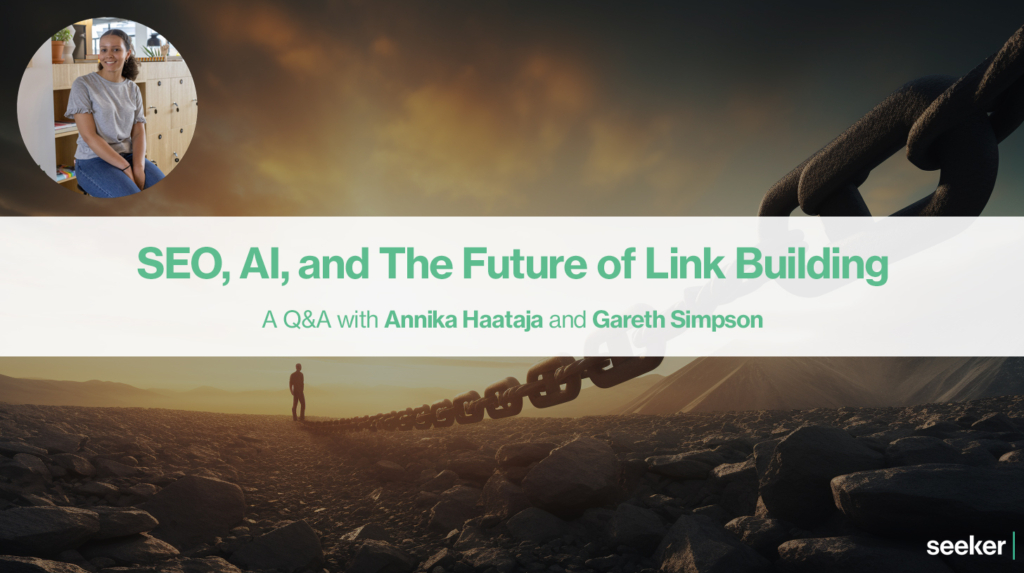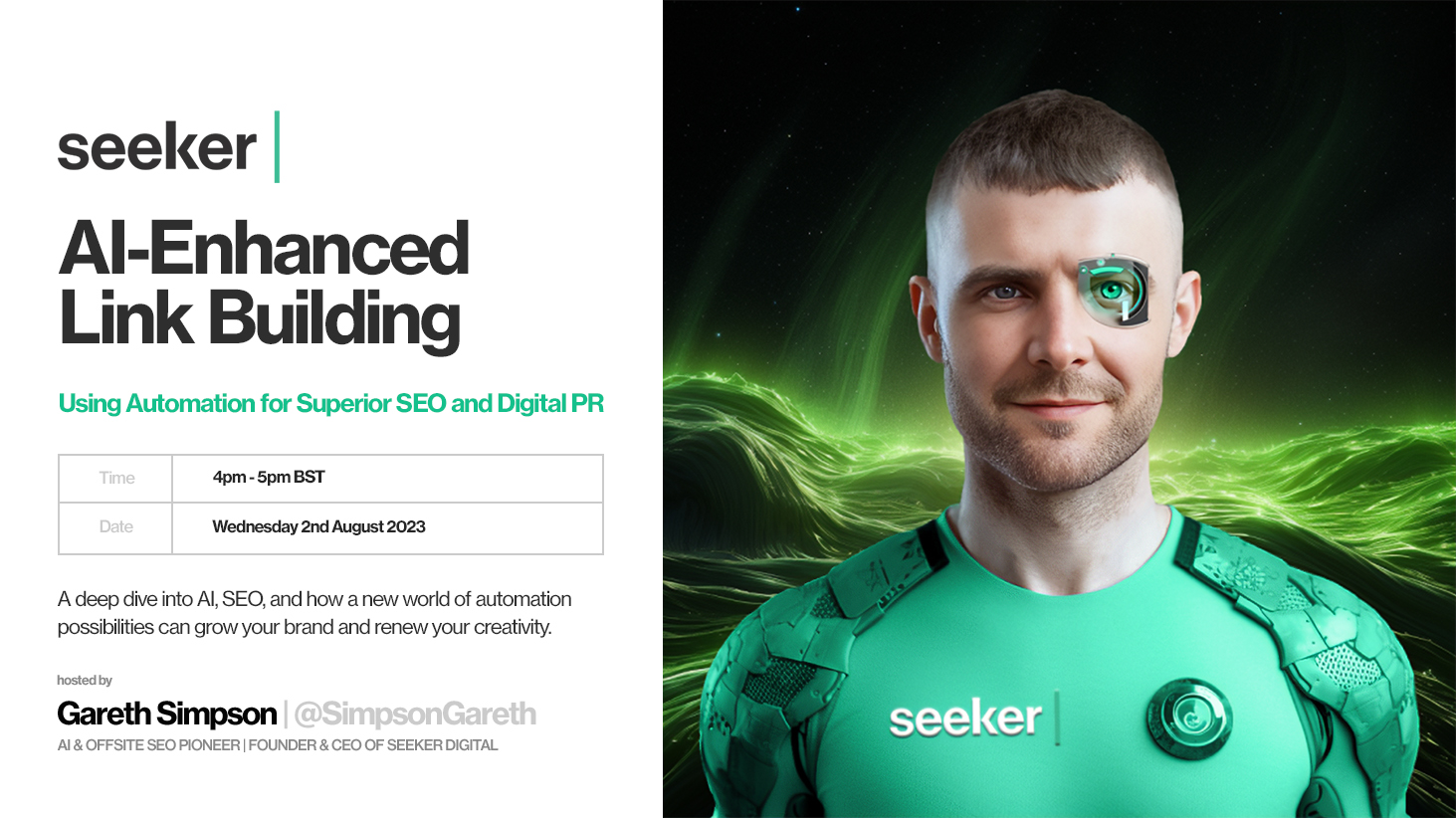
June has already flown by, with plenty going on at Seeker HQ as always. But one topic that’s been at the forefront of all of our minds (and work) recently is AI.
Everyone and their dog is talking about AI right now, and it’s causing significant ripples across the SEO industry. So, is AI a force for good in SEO? How will this new technology impact search in the long run?
To discover the answers to these questions and more, our copywriter Liv Batten delved into all things AI and SEO with our Head of SEO Annika Haataja and our CEO (and AI enthusiast) Gareth Simpson.
Here’s how the discussion went.
As SEO experts, what are your overall perspectives on the utilisation of AI in SEO?
AI is a little like marmite — while some are embracing it, others are disapproving of its increasing influence. Either way, there’s no escaping it — yes, AI will cause industry-rattling disruptions, but equally, can AI tools help you unlock new opportunities?
Annika: I think there are two parts to AI and SEO: SEO professionals using AI, and users leveraging AI for their search. Speaking of the first part, I find it quite exciting. The field has progressed rapidly, but its application is still in its early stages. AI can be quite useful in certain areas, but not all. Many SEO professionals are currently experimenting with AI before incorporating it as a new process or tool.
I believe it will become a supportive tool, helpful in analysing large amounts of data, aiding research, and even in specific tasks related to technical SEO. It can also be useful in content production and management, but it’s not an all-in-one solution. I think it’s best to experiment as much as you can and figure out how it works best for you. While it’s a valuable addition, I don’t see it replacing SEO tools, at least for now.
Gareth: That’s a good distinction. We have to think about SEO professionals using AI to enhance their work and the industry adapting to AI being implemented in search products and tools. For example, tools like chatGPT are affecting search and other productivity tools. We need to adapt as an industry to AI being integrated into our everyday lives. I see changes in search behaviour due to AI, as well as virtual reality and augmented reality.
Take the Apple Vision Pro product release, for instance — it’s going to revolutionise search as most of it is done on mobiles. How is search going to play into those tools? I believe we’re going to interact differently with them. We’ll use voice interfaces, virtually touch the interface, and even explore maps in 3D. SEO will have to adapt for these new interfaces and platforms.
That’s the long-term, significant change, but how AI affects search behaviour here and now is also important for SEO professionals. There’s going to be a small window of opportunity where we can use AI tools to do the ‘current’ version of SEO. However, as search technologies and platforms evolve, many of the current tactics might become obsolete. We have to continually innovate to stay ahead of these changes.
On the one hand, I feel excited about these opportunities, as it means constant innovation and new challenges. On the other hand, it can be daunting because it requires adapting to fast-paced changes. But overall, I think it’s exciting and brings a renewed enthusiasm to SEO.
Annika: I believe AI can be useful for streamlining manual tasks, like optimising internal links or automating meta title and description generation. However, it’s important to remember that someone needs to be there to check the quality of the work in the first place.
Which aspects of SEO are becoming easier with the integration of AI, and which are becoming more challenging?
As with any new technology — particularly one this transformative — AI inevitably introduces a number of advantages alongside several new challenges. So, how is AI empowering SEO professionals, and where is it introducing complications or roadblocks?
Annika Haataja: Well, AI has shifted our roles towards consultants or strategists rather than just executives or analysts. We now use AI in our work to become more efficient, it helps with accuracy and removes human error. Also, it assists in initial stages of strategy and research, it finds information quicker and summarises it. I often use AI to summarise large amounts of text. Although it’s not solely for SEO, it’s useful for creating document templates and processes.
However, things are also becoming more challenging. The way search engines are evolving and AI’s growing prevalence are changing the user’s experience. Users can find everything in one search, so standing out from other results is becoming a challenge for SEO. Your meta titles and descriptions have to be convincing and interesting. You have to be the one to attract traffic.
Branding for companies will be even more important moving forward. Building trust with users, especially when they may be sceptical of new technology, is key. The challenge is to make sure these AI chatbots understand your brand as an entity.
Gareth: Exactly, we have to optimise for the answers and figure out what signals search engines will use for ranking websites or being included in the answers. It’s about experience and authority. For instance, if we’re writing a detailed guide on changing light bulb fittings, we need someone experienced in electrics.
AI might even predict where you’re going to build your link next, based on past patterns. So, old low-quality link building will slowly start to fade away. Everybody needs to level up their quality standards. With unsupervised machine learning, the AI will find its own signals to measure and decide what’s relevant.
Annika: As long as the content is helpful, original, and makes sense for the user, then that’s what Google wants from it. The relevance is important, not just for your site, but for the site that is linking to your site. If both can win, then why not?
Can you shed light on some common misconceptions and truths about AI and SEO?
Despite its increasing ubiquity, there’s still much to learn about AI. Its speedy evolution has been met with fear and derision by some, which has led to misinformation and exaggeration — not everything should be taken at face value, and some lingering myths about AI ought to be debunked.
Annika: I think one common misconception is that AI will replace SEO professionals, content writers, or technical people. In my view, the industry has largely accepted AI as a tool, not a replacement. AI is here to assist and support, not to replace content creation. We have seen a lot of content produced recently that emphasises this point.
Gareth: A couple of misconceptions come to mind. The first one is the belief that using AI will result in lower-quality work. This probably stems from AI’s initial use in content generation. AI was used to create vast amounts of content, much of which was generic or spammy, which didn’t add value to the web.
Obviously, we don’t want to be doing that, but that’s not the right mindset and it’s not how we should be using AI. I was on stage at a panel in Manchester recently and people asked me, “Are you using AI in your agency?” My answer was yes, I’m actively trying to encourage the team to use it more — not to replace what they do but to enhance it; to make it quicker, cheaper and ultimately better.
It’s just the same as buying a handmade table versus an IKEA table. In the right hands, a handmade table is going to be better. In reality, AI can produce both lower-quality and higher-quality work than humans. We must be very careful about how we use it and what we use it for.
Annika: The situation is complicated due to the abundance of opinions on AI. Since AI has become so common, everyone seems to have their view on it, and often these opinions are based more on personal beliefs than on actual facts. Especially for newcomers in the industry, it can be challenging to discern what’s real and what’s not. This can make it tricky to navigate through all the available information.
Gareth: Another misconception is the belief that AI is always more accurate than humans. AI is not perfect. It can hallucinate or lie, and it can’t show us its “working out” process like a human could. This means that while AI can be beneficial for many tasks, we need to be cautious about using it for mission-critical tasks, especially where precision is needed.
We can’t let it just take over our process. We’re not going to go and put AI in the middle of a decision tree, for example, for it to send our strategy in the wrong direction. We can’t trust it to do that right now. You’ll see all these AI tools pop up that promise to audit your website and do your technical audit for you, but we don’t know what it’s missed or what it’s made up.
Want to learn more about separating AI fact from AI fiction? Join Gareth’s free webinar entitled AI-Enhanced Link Building on August 2nd at 4pm BST. He’ll be discussing how you can use automation to achieve superior SEO and digital PR.

How do you envisage the role of AI in internal linking?
Both Annika and Gareth share the belief that AI will be more effective in certain areas of SEO than others, but what about when it comes to internal link building? What part can AI tech play here?
Annika: From a human perspective, when you encounter a problem, you consider it from your strategic standpoint because you possess knowledge that the AI might lack, such as the core objectives for your website or its primary revenue-generating area.
For instance, you could use AI to suggest internal links within new content, but there could be issues with the AI understanding the context or other areas of your site. Therefore, you might need additional tools, like a browser plugin, to assist with that. But it’s worth noting that AI isn’t advanced enough to replace tech SEOs completely, as we still need them to perform final checks and ensure that the internal linking strategy is progressing because it’s ongoing work.
Of course, there are existing tools that can make recommendations for internal linking within a website, based on specific pages you want to build links to. However, these tools don’t actually crawl your page, so they don’t know the content. They make assumptions based on the URLs. For example, the old version of GPT doesn’t crawl your page.
Other tools, like Ahrefs, do internal linking recommendations and give you opportunities based on the top keywords in your text. So, the concept of AI providing internal linking recommendations isn’t new, but improvements in crawling and scraping could make these recommendations more accurate.
There’s a lot of content and shared experiences on this topic, but remember, AI doesn’t always provide consistent results. What works for someone else might not work for you, and you may get different results even with the same prompt. So, it’s a process of trial and error.
Gareth: Exactly, AI can be unpredictable. Sometimes it can yield different results in almost identical scenarios. It feels like AI can have moods and bad days! This randomness might be built into the system on purpose to prevent SEOs from reverse-engineering the algorithm, maintaining a certain unpredictability.
When it comes to internal linking, it needs to be handled cautiously. While AI can handle language generation well, it’s not yet equipped to fully optimise internal links. An interesting approach I observed recently was by Wil Reynolds, who uses AI to update posts with a list of all relevant internal links. This aligns with Google’s guidance on making it clear to users what to expect when they click a link. So while AI can assist with parts of the internal linking process, it’s not yet capable of handling everything.
What advice would you give to someone who wants to incorporate AI into their SEO strategy but is unsure where to begin?
It’s fair to assume that many SEO professionals currently find themselves in this position — they have the desire to absorb AI technology into their SEO strategy, but they’re simply unsure how to do so. What do Annika and Gareth recommend to those facing this predicament?
Annika: I recommend exploring social media, especially Twitter and LinkedIn. Many SEO experts share their experiments and findings there. It’s also beneficial to follow AI experts, as they might offer a unique perspective or introduce tools that the SEO community hasn’t yet embraced.
Gareth: That’s right. Setting up filters on social media platforms can help cut through the noise and focus on the insights shared by AI innovators. Also, don’t limit yourself to the SEO community. Look at how other industries are leveraging AI and see if similar approaches could solve SEO problems.
Most importantly, get hands-on experience with AI. Think of a problem and then try to solve it using AI. To make it more fun, apply AI to one of your hobbies and see what creative solutions you can develop.
Annika: Finally, I’d advise against getting stuck with one AI tool. Try various tools, including AI chatbots, which are often free. The more you experiment, the better you’ll understand how AI works, and you’ll be able to apply that knowledge to your future work. So, rather than following a single trend, try to broaden your horizons as much as possible.
Any final thoughts?
“We’ve trained both large and small in-house marketing teams on AI usage,” advises Gareth. “If you’re part of a tech company, a SaaS company, an e-commerce brand, or any other in-house marketing role, especially in a senior leadership position, we offer consultations on integrating AI into your processes and tactics. While this is a selective and small-scale initiative, it has proven to be enjoyable and effective. So if anyone is interested in this, feel free to reach out and we can arrange a call.”
Keen to find out how Seeker can guide you on incorporating AI technology into your SEO strategy? Get in touch with us today.
